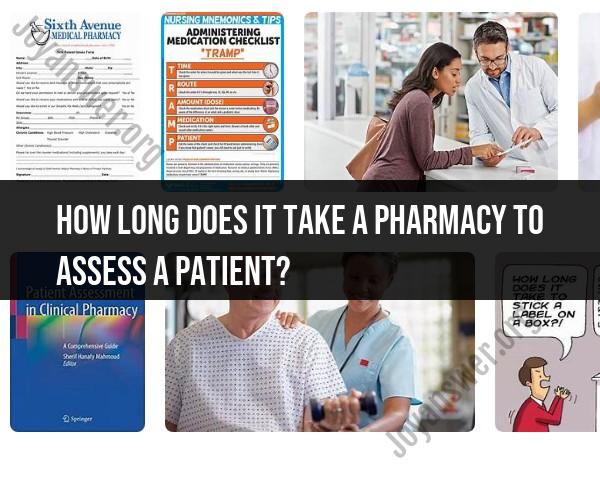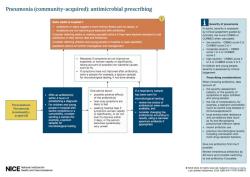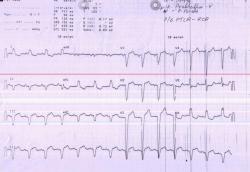How long does it take a pharmacy to assess a patient?
The time it takes for a pharmacy to assess a patient can vary widely depending on several factors, including the specific patient's needs, the pharmacy's workload, and the type of assessment being conducted. Here are some common scenarios:
Basic Medication Dispensing:
- When a patient comes to a pharmacy to pick up a prescription, the assessment typically involves verifying the prescription, checking for potential drug interactions, and ensuring that the medication is suitable for the patient's medical history. This process often takes only a few minutes.
Pharmacist Consultation:
- If a patient requests a consultation with the pharmacist to discuss their medications, potential side effects, or any other health-related concerns, the assessment may take 10-15 minutes or longer, depending on the complexity of the patient's questions.
Medication Therapy Management (MTM):
- For more comprehensive assessments, such as Medication Therapy Management services, which involve a detailed review of a patient's medications and health conditions, the assessment can take 30 minutes to an hour or more. These assessments are often scheduled appointments to ensure adequate time for discussion and recommendations.
Immunizations:
- If a pharmacy is offering immunizations, the assessment, which involves reviewing the patient's immunization history, providing information about the vaccine, obtaining informed consent, and administering the vaccine, may take about 15-30 minutes.
Chronic Disease Management:
- For patients with chronic diseases like diabetes or hypertension, the assessment may be ongoing and require multiple interactions over time. Regular follow-ups and monitoring are essential.
Specialized Services:
- Pharmacies may offer specialized services such as smoking cessation, comprehensive health screenings, or medication synchronization programs, which can involve multiple assessments over an extended period.
It's important to note that pharmacists play a crucial role in assessing and addressing patients' medication and health-related needs. The time needed for assessment will depend on the specific circumstances, the level of service provided, and the patient's individual requirements. For more complex assessments or services, it's common for pharmacies to schedule appointments to ensure that both the pharmacist and the patient have adequate time for a thorough evaluation and discussion.
The Process of Pharmacy Patient Assessment
Pharmacy patient assessment is the process of gathering and evaluating information about a patient's health status and medication needs. This information is used to develop a personalized medication plan and to monitor the patient's progress over time.
The pharmacy patient assessment process typically includes the following steps:
- Review of the patient's medical history. This includes the patient's current medications, allergies, medical conditions, and any other relevant information.
- Physical examination. This may include a blood pressure check, pulse check, and other basic physical assessments.
- Medication review. This involves reviewing the patient's current medications to identify any potential drug interactions, side effects, or other concerns.
- Patient education. This involves educating the patient about their medications, how to take them properly, and what to do if they experience any side effects.
Timelines and Expectations for Patient Assessment at a Pharmacy
The timeline and expectations for patient assessment at a pharmacy can vary depending on the patient's individual needs and the pharmacy's policies and procedures.
In general, patients can expect their pharmacist to spend at least 15 minutes reviewing their medical history and medications. However, this time may be longer for patients with complex medical conditions or who are taking multiple medications.
Patient Assessment Tools and Techniques in Pharmacy Practice
There are a variety of patient assessment tools and techniques that pharmacists can use. Some common tools include:
- Medical history questionnaires: These questionnaires ask patients to provide information about their medical history, medications, and other relevant information.
- Physical assessment tools: These tools are used to assess the patient's vital signs and other physical parameters.
- Medication review tools: These tools are used to identify potential drug interactions, side effects, and other concerns with the patient's medications.
- Patient education tools: These tools are used to educate patients about their medications, how to take them properly, and what to do if they experience any side effects.
Collaborative Care and Multidisciplinary Assessment in Pharmacy
Pharmacists often collaborate with other healthcare professionals, such as physicians, nurses, and dietitians, to assess patients and develop medication plans. This collaborative approach to care helps to ensure that patients receive the best possible care.
For example, a pharmacist may consult with a physician before prescribing a new medication to a patient with a complex medical condition. Or, a pharmacist may work with a dietitian to develop a meal plan for a patient with diabetes.
Ensuring Patient Privacy and Confidentiality in Pharmacy Assessment
Pharmacists are required to protect the privacy and confidentiality of patient information. This means that pharmacists should only share patient information with other healthcare professionals who have a need-to-know.
Pharmacists should also take steps to protect patient information from unauthorized access. For example, pharmacists should keep patient records in a locked cabinet and should only allow authorized personnel to access these records.
Conclusion
Pharmacy patient assessment is an important part of providing pharmaceutical care. By carefully assessing each patient's individual needs, pharmacists can develop personalized medication plans that help patients to achieve their health goals.












